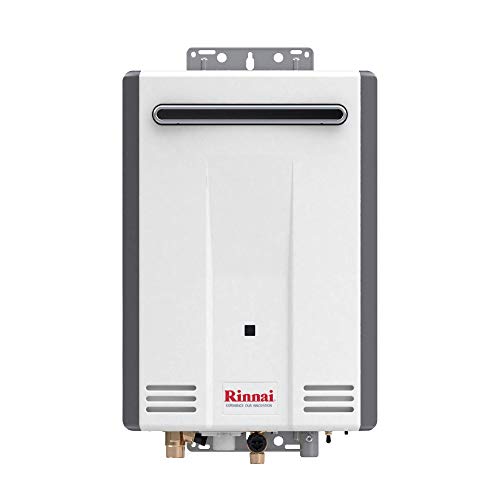Tankless Water Heater Size Calculator: What Size Tankless Water Heater Do I Need?
Calculate the right tankless water heater size by entering your household details below.
List of the Top 10 Best Tankless Water Heater:
What is a Tankless Water Heater?
A tankless water heater, also known as an on-demand or instantaneous water heater, heats water directly as it flows through the device. Unlike traditional storage tank heaters, it doesn't store pre-heated water, providing hot water only when needed and helping reduce energy costs.
How Does a Tankless Water Heater Work?
Tankless water heaters operate through a three-step process:
- Water Flow Detection: When a hot water tap opens, cold water enters the unit, triggering the flow sensor.
- Heat Activation: The gas burner or electric heating elements activate to heat the water passing through the heat exchanger.
- Temperature Monitoring: The unit continuously monitors and adjusts to maintain the desired water temperature.
Types of Tankless Water Heaters
| Type | Description | Best For |
|---|---|---|
| Gas-Fired | Uses natural gas or propane for heating | Large homes, high demand |
| Electric | Uses electric heating elements | Small homes, point-of-use |
| Condensing | Captures exhaust heat for higher efficiency | Energy-conscious homes |
| Non-Condensing | Traditional venting system | Standard installations |
Benefits of Tankless Water Heaters
Energy Efficiency
- Up to 34% more efficient for homes using less than 41 gallons daily
- No standby heat loss
- Lower monthly utility bills
- ENERGY STAR certification available
Space Saving
- Compact wall-mounted design
- No storage tank needed
- Flexible installation options
- Perfect for smaller homes
Performance
- Endless hot water supply
- Consistent temperature
- No recovery time needed
- Longer lifespan (20+ years)
Environmental Impact
- Reduced carbon footprint
- Lower energy consumption
- Fewer materials used
- Longer service life
How to Size a Tankless Water Heater Correctly?
Flow Rate Requirements (GPM)
| Fixture | Average Flow Rate (GPM) | Temperature Requirement (°F) |
|---|---|---|
| Shower | 2.0-2.5 | 104-106 |
| Bathroom Faucet | 0.5-1.5 | 100-102 |
| Kitchen Sink | 1.5-2.2 | 110-115 |
| Dishwasher | 1.5-2.0 | 120-125 |
| Washing Machine | 2.0-2.5 | 120-130 |
Temperature Rise Calculation
| Climate Zone | Groundwater Temperature (°F) | Required Rise for 120°F |
|---|---|---|
| Northern | 35-45 | 75-85°F |
| Central | 45-55 | 65-75°F |
| Southern | 55-65 | 55-65°F |
Important Factors in Tankless Water Heater Sizing
1. Peak Hot Water Demand
Calculate maximum simultaneous usage:
- Common Combinations:
- Multiple showers running
- Shower + dishwasher
- Washing machine + sink
- Flow Rate Totals:
- Add GPM for each fixture
- Consider usage patterns
- Include future needs
2. Temperature Rise Requirements
Consider these factors:
- Incoming water temperature
- Desired output temperature
- Seasonal variations
- Climate zone impact
3. Fuel Type Considerations
Choose based on:
- Available fuel sources
- Installation costs
- Operating efficiency
- Local utility rates
Tankless Water Heater Maintenance
Essential Maintenance Tasks
- Annual Service:
- Flush system to remove scale
- Clean inlet filter
- Check for leaks
- Inspect venting
- Regular Checks:
- Monitor performance
- Test safety features
- Clean air intake
Frequently Asked Questions About Tankless Water Heater Sizing
How do I know if a tankless water heater is right for my home?
Consider these factors:
- Current hot water usage patterns
- Available fuel types (gas, electric)
- Installation space and requirements
- Initial budget vs long-term savings
- Local climate conditions
What's the difference between gas and electric tankless water heaters?
Key differences include:
- Gas units typically have higher flow rates (up to 11 GPM)
- Electric units are often more compact and easier to install
- Gas units usually have lower operating costs
- Electric units don't require venting
- Gas units typically have higher initial installation costs
What size tankless water heater do I need?
Sizing depends on:
- Peak hot water demand (total GPM needed)
- Temperature rise required (based on groundwater temperature)
- Number of simultaneous applications
- Fuel type availability
- Climate zone considerations
How much does a tankless water heater cost to operate?
Operating costs include:
- Energy costs: $100-300 per year depending on usage
- Annual maintenance: $75-150
- Descaling supplies: $20-50 per year
- Filter replacements: $10-30 annually
- Potential water softener costs in hard water areas
Can I install a tankless water heater myself?
Professional installation is recommended because:
- Gas line sizing may need modification
- Proper venting is critical for safety
- Electrical requirements may need upgrading
- Local codes must be followed
- Warranty may require professional installation
How long do tankless water heaters last?
Average lifespan is 20+ years with proper maintenance:
- Regular maintenance extends life
- Parts can be replaced individually
- Scale buildup can reduce lifespan
- Water quality affects longevity
- Usage patterns impact durability
Do tankless water heaters need special maintenance?
Regular maintenance includes:
- Annual system flushing to remove scale
- Cleaning or replacing water filters
- Checking for proper venting
- Inspecting for leaks and corrosion
- Testing safety features and controls
Will a tankless water heater work with hard water?
Considerations for hard water:
- Regular descaling is crucial
- Water softener may be recommended
- Scale filters can help protect the unit
- More frequent maintenance may be needed
- Warranty may require water treatment
What are the environmental benefits of tankless water heaters?
Environmental advantages include:
- Reduced energy consumption
- Lower carbon footprint
- Less water waste
- Longer lifespan means less waste
- Recyclable components
What about power outages?
During power outages:
- Electric units won't work without power
- Gas units need electricity for controls
- Battery backup systems available
- Some models have freeze protection
- Manual operation not possible









